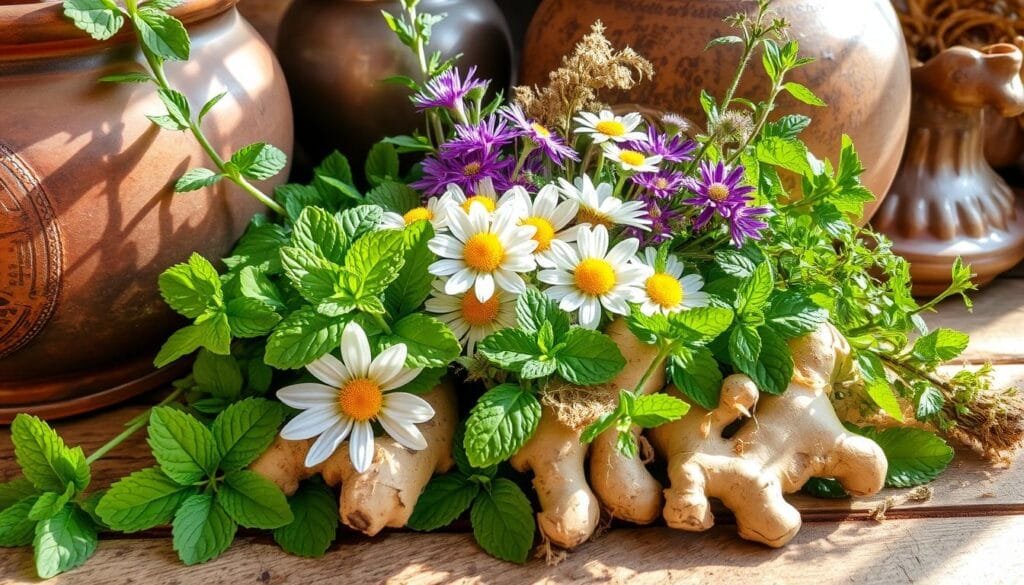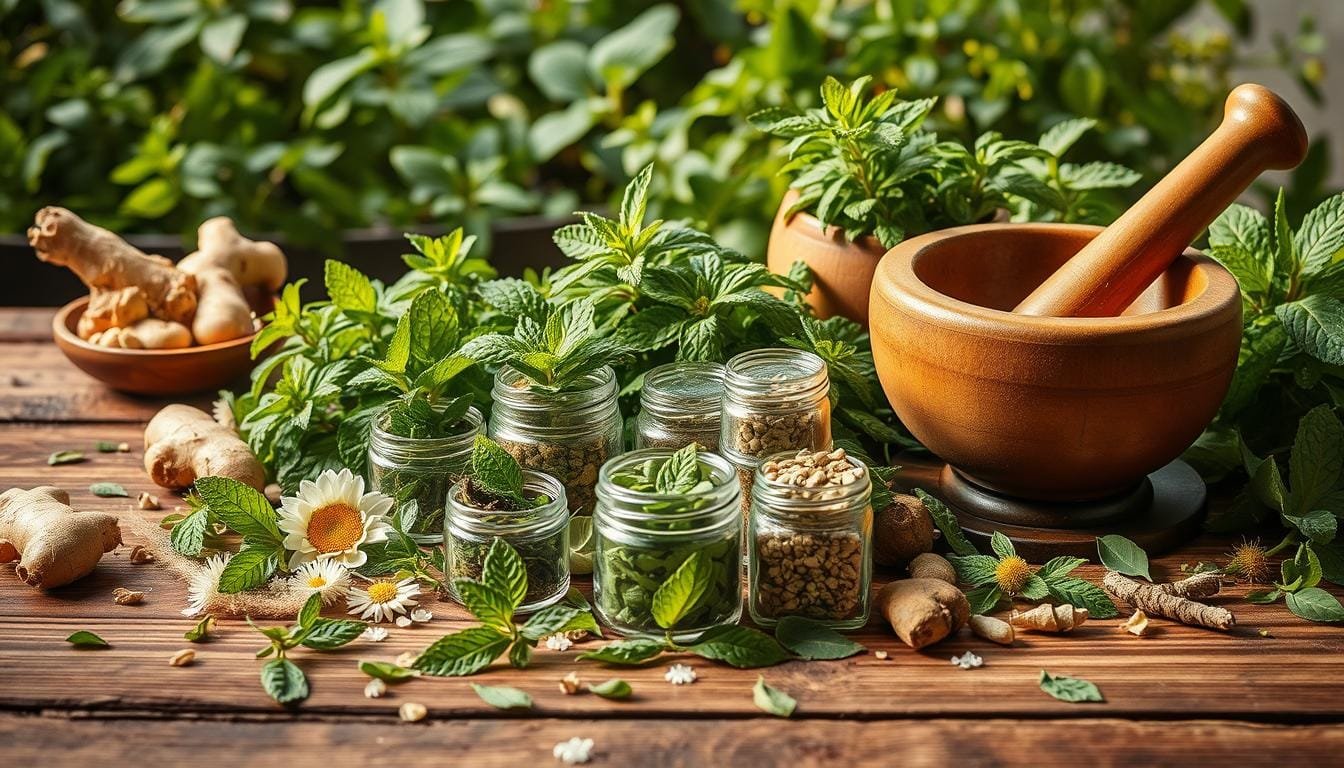I’m passionate about natural wellness and the importance of a healthy digestive system. About 60-70 million people in the U.S. deal with digestive diseases. This guide will show how herbal remedies can help with common digestive problems and improve gut health naturally.
Herbal medicines are a gentle way to ease digestive symptoms, unlike harsh drugs. Studies reveal 40% of parents use herbs and spices for their kids’ digestive issues. These natural solutions can reduce inflammation and soothe the gut, all without harsh side effects.
In this guide, we’ll look at the science behind herbal remedies. You’ll learn how to use them to improve your digestive health. Whether you’re dealing with bloating, indigestion, or just want better gut health, this guide will help you take a natural approach.
Understanding Digestive Health and Its Impact on Overall Wellness
Good digestive health is key to our overall well-being. Our digestive system breaks down food, absorbs nutrients, and gets rid of waste. If it doesn’t work right, we can face many health problems.
Common Digestive Issues and Their Symptoms
Many people deal with digestive problems. Inflammatory bowel diseases like Crohn’s and ulcerative colitis cause diarrhea, fatigue, and pain. Celiac disease, caused by gluten, leads to diarrhea and bloating.
Gallstones can cause sharp pain, often after eating fatty foods. If you have ongoing pain, weight loss, or diarrhea, see a gastroenterologist. They can help with treatments and tests to find the cause.
The Role of Gut Microbiome in Digestive Health
The gut microbiome is full of microbes that affect our health. It can influence conditions like obesity and diabetes. Probiotics, similar to gut microbes, can improve health and help with IBS symptoms.
How Inflammation Affects Digestive Function
Chronic intestinal inflammation can cause serious diseases. Food additives can harm gut health and lead to inflammation. Eating well and staying active can help keep your digestive system healthy.
| Digestive Issue | Symptoms | Potential Complications |
|---|---|---|
| Inflammatory Bowel Disease (IBD) | Severe diarrhea, fatigue, weight loss, abdominal pain | Malnutrition, intestinal damage |
| Celiac Disease | Diarrhea, bloating, gas | Malnutrition, intestinal damage |
| Gallstones | Sharp abdominal pain, specially after high-fat meals | Requires medication or surgery for removal |
Essential Herbal Remedies for Digestive Health
I’ve dealt with digestive problems before and found natural solutions are key. Herbal remedies have been used for ages in Ayurveda and Traditional Chinese Medicine. Modern science backs up their historical uses.
Some top herbs for digestive health are:
- Turmeric – It fights inflammation in the gut, easing symptoms of IBS.
- Slippery elm – This herb softens stool, helping with constipation and diarrhea.
- Peppermint – Peppermint oil relaxes digestive tract muscles, easing pain and discomfort.
- Marshmallow root – It coats the digestive tract, soothing acid reflux and gastritis.
Other herbs like ginger, chamomile, and aloe vera also support digestion. They help with nausea, bloating, inflammation, and bowel regularity.
| Herb | Potential Benefits for Digestive Health |
|---|---|
| Ginger | May reduce nausea, vomiting, bloating, and diarrhea. |
| Peppermint | May have anti-inflammatory effects and help with gas, bloating, cramps, nausea, and vomiting. |
| Chamomile | Known for soothing and anti-inflammatory effects, chamomile may ease stomach discomfort. |
| Aloe Vera | Research on its effectiveness is mixed, but aloe vera juice is sometimes used for IBS and constipation. |
Remember, natural treatments are great but don’t replace medical care for serious issues. Always talk to your doctor before adding new herbal remedies to your routine.

Powerful Benefits of Turmeric and Ginger for Gut Health
Looking for natural ways to improve your digestion? Turmeric and ginger are great options. These spices have many benefits for your gut health. They can help with common digestive problems.
Curcumin’s Anti-inflammatory Properties
Turmeric’s strength comes from curcumin. It’s known for fighting inflammation. Research shows it helps with Crohn’s, ulcerative colitis, IBS, and gastritis. You need 500 to 2,000 milligrams of curcumin daily.
Ginger’s Role in Reducing Nausea and Digestive Discomfort
Ginger is famous for its anti-inflammatory and anti-spasmodic effects. It’s a trusted remedy for many digestive issues. Ginger helps with indigestion, bloating, nausea, and stomach pain. Aim for 500 milligrams to 3 grams of ginger daily.
Adding turmeric and ginger to your diet can boost your gut health. You can use them in meals or as supplements. They’re key to a natural digestive health plan.
Traditional Digestive Herbs: Peppermint and Chamomile
Peppermint and chamomile are top picks for natural digestive health. They’ve been used for ages to ease gut troubles and boost digestion.
Peppermint oil has L-menthol, which relaxes the gut muscles. Studies show it cuts down on IBS pain and bloating.
Chamomile is packed with oils and flavonoids. It fights inflammation, relaxes muscles, and eases gas. It’s been used for many digestive problems, like colic and ulcers. You can take 500-1,000 mg of chamomile capsules or drink 1-4 cups of chamomile tea.
| Herb | Key Constituents | Digestive Benefits |
|---|---|---|
| Peppermint | L-menthol | Antispasmodic, reduces IBS symptoms |
| Chamomile | Volatile oils, flavonoids | Anti-inflammatory, antispasmodic, carminative |
Peppermint oil capsules or chamomile tea can help with many gut issues. They support your digestive health naturally.

“Herbal remedies like peppermint and chamomile have been used for centuries to soothe digestive woes. Their proven benefits make them valuable additions to a comprehensive digestive health plan.
Healing Properties of Slippery Elm and Marshmallow Root
Slippery elm and marshmallow root are amazing herbs for digestive health. They have a lot of mucilage, which is a special substance. This substance creates a protective layer on the digestive tract’s mucous membranes.
How These Herbs Soothe the Digestive Tract
The mucilage in these herbs coats and calms the digestive system. It helps with issues like inflammatory bowel diseases, IBS, and acid reflux. This makes them great for soothing the digestive tract.
Slippery elm is often taken as a powder or in capsules. Marshmallow root is usually powdered or in capsules too. Both are safe for long-term use and are well-tolerated.
Proper Usage and Dosage Guidelines
Adults should take 400-500 mg of slippery elm, 2-3 times a day. Marshmallow root can be up to 6 grams daily, split into smaller doses.
Children’s dosages need a healthcare provider’s guidance, based on their weight. Pregnant women should avoid slippery elm due to possible risks from the elm tree’s bark.
Take these herbs 2 hours before or after other medicines. This helps them not interfere with other compounds. Always talk to a healthcare expert before adding slippery elm or marshmallow root to your routine.
“Slippery elm and marshmallow root have been used for centuries to soothe and support digestive health, thanks to their unique mucilage content.”
Incorporating Digestive Spices into Your Daily Diet
I’ve learned how great digestive spices and herbs are for health. They make food taste better and help our gut health. It’s a win-win for our taste buds and our health.
Cinnamon is a favorite of mine. It has antioxidants that fight inflammation and may lower the risk of chronic diseases. It also helps control blood sugar, which is good for our gut.
Cocoa is another favorite. It has flavonoids that reduce stress and improve digestion. Cocoa boosts metabolism and supports good gut bacteria, making it great for digestion.
- Cumin is great for digestion. It boosts bile flow and digestive enzymes, helping food digest better. It can also help with irritable bowel syndrome (IBS).
- Cayenne pepper is another spice I use. It stimulates the stomach nerves, reducing ulcers and fighting infections.
Adding these spices and herbs to my diet has really helped my digestion. They’re key to my herbal health plan. I think everyone should try them for better gut health.

“Spices not only add flavor to our food but can also have a positive impact on our digestive health. By incorporating them into our daily diet, we can harness the power of nature to support our gut and overall well-being.”
Natural Solutions for Common Digestive Problems
Dealing with digestive issues can be frustrating. But, there are many natural remedies that can help. Whether you’re dealing with bloating and gas or acid reflux and heartburn, herbal solutions can make a big difference.
Herbs for Bloating and Gas
Herbs like peppermint, ginger, and fennel can help with bloating and gas. Peppermint relaxes the digestive tract, easing gas buildup. Ginger helps with nausea and reduces bloating. Fennel seeds break down gas-producing foods, providing relief.
Remedies for Acid Reflux and Heartburn
For acid reflux and heartburn, try soothing herbs like slippery elm and aloe vera. Slippery elm protects the esophagus, calming irritation. Aloe vera juice soothes inflammation and discomfort. Deglycyrrhizinated licorice (DGL) also helps with acid reflux.
Adding probiotics to your routine can also help. They regulate digestion and manage issues like antibiotic-induced diarrhea. Probiotics balance gut bacteria, improving digestive health.
While natural solutions are effective, always talk to your healthcare provider. They can help if you have persistent or severe digestive problems. With the right herbal remedies and self-care, you can find relief and improve your digestive health.

| Herb | Digestive Benefits |
|---|---|
| Peppermint | Soothes the digestive tract, helps relieve gas and bloating |
| Ginger | Reduces nausea and aids in digestion, can help with bloating |
| Fennel | Contains compounds that help break down gas-producing foods |
| Slippery Elm | Creates a protective coating on the esophagus, soothes acid reflux |
| Aloe Vera | Has a soothing effect, can reduce inflammation and discomfort from acid reflux |
| Deglycyrrhizinated Licorice (DGL) | May help alleviate acid reflux symptoms |
| Probiotics | Helps regulate digestion and manage issues like antibiotic-induced diarrhea |
The Science Behind Herbal Digestive Support
Herbal remedies for digestive health have been studied a lot. Herbal medicine research and clinical studies have shown their worth. But, getting these remedies into regular healthcare is hard.
Some herbs have been proven to help with digestive problems. Peppermint oil helps with irritable bowel syndrome (IBS) in 75% of people. Ginger eases nausea, and turmeric helps with ulcerative colitis.
But, not all herbal remedies have been well-studied. Doctors use old knowledge and some research to suggest herbs for digestive issues.
| Herb/Spice | Digestive Health Benefit | Key Finding |
|---|---|---|
| Peppermint Oil | Irritable Bowel Syndrome (IBS) | 75% of patients experienced reduced IBS symptoms in clinical trials |
| Ginger | Nausea | Proven effective in alleviating nausea |
| Turmeric | Ulcerative Colitis | Helpful in managing ulcerative colitis symptoms |
Scientists are looking into herbal remedies for digestive health. New clinical studies show promise. As we learn more about the gut microbiome, herbal medicine will become more important.
Safe Usage Guidelines and Possible Interactions
Herbal remedies can be great for your health, but you need to be careful. It’s key to think about herbal safety and drug interactions. These natural supplements can sometimes mix badly with other complementary medicine treatments.
Turmeric, for example, can make gallbladder problems or GERD worse for some people. Milk thistle, which helps the liver, can drop blood sugar levels. This is a problem for those at risk of low blood sugar. Also, slippery elm might mess with how some medicines are absorbed.
When to Consult Healthcare Provider
Always talk to a healthcare provider before adding herbal remedies to your routine. This is very important if you’re on prescription meds or have health issues. They can help you use these herbs safely and effectively.
Combining Herbs with Conventional Medicines
- Tell your healthcare provider about any herbal supplements you’re taking. They can check for possible interactions and give you advice.
- Start with small doses of herbal remedies and watch how your body reacts. If it’s okay, you can slowly increase the amount.
- Think about when you take your herbal and regular medicines. Some interactions might depend on when you take them.
- Keep a log of your herbal supplement use. Write down any effects you notice. This can help your healthcare provider understand better.
Being proactive and talking openly with your healthcare team is key. This way, you can enjoy the benefits of herbal remedies while avoiding risks of drug interactions. Always put your herbal safety and health first when exploring complementary medicine.
Creating Your Personalized Herbal Digestive Health Plan
Improving my digestive health means I need a plan that fits me. Everyone’s body and health issues are different. So, making a personalized herbal digestive health plan is key.
This plan starts with knowing my digestive problems. I’ll look at issues like bloating, gas, acid reflux, or irregular bowel movements. By understanding these, I can find herbal remedies that target my specific needs.
Ginger and turmeric are great for reducing inflammation. Peppermint and chamomile can help soothe my digestive system.
Next, I’ll add these herbs to my daily routine carefully. I’ll start with small amounts and watch how my body reacts. If needed, I’ll adjust the amount or mix of herbs to find the perfect fit for me.
I’ll also think about how my diet, stress levels, and lifestyle affect my digestion. Making these changes can help my herbal plan work better. Regular check-ups with my healthcare provider will keep my plan on track and tailored to my health.
FAQ
What is the importance of digestive health for overall wellness?
What are some common digestive issues?
How can herbal remedies help with digestive health?
What are some popular herbs for digestive health?
How do turmeric and ginger benefit digestive health?
What are the benefits of peppermint and chamomile for digestive issues?
How do slippery elm and marshmallow root help with digestive health?
What other spices can promote healthy digestion?
How can herbal remedies help with specific digestive issues?
What are some considerations when using herbal remedies for digestive health?
How can I create a personalized herbal digestive health plan?
Source Links
- https://www.rupahealth.com/post/top-10-herbs-for-intestinal-inflammation
- https://vtherbcenter.org/wp-content/uploads/2012/04/Herbs-for-Digestive-Health.pdf
- https://www.austingastro.com/2024/07/05/gut-instincts-exploring-the-basics-of-digestive-health-and-its-impact-on-overall-wellness/
- https://newsinhealth.nih.gov/2017/05/keeping-your-gut-check
- https://www.healthline.com/health/digestive-health
- https://www.northshore.org/healthy-you/5-home-remedies-for-digestive-health/
- https://www.verywellhealth.com/herbs-and-natural-remedies-for-ibs-1944988
- https://www.eatingwell.com/article/7561449/health-benefits-of-turmeric-ginger/
- https://www.healthline.com/nutrition/turmeric-and-ginger
- https://www.healthline.com/nutrition/tea-for-bloating
- https://www.heinens.com/stories/the-best-herbal-teas-for-digestive-health/
- https://pmc.ncbi.nlm.nih.gov/articles/PMC10591345/
- https://www.mountsinai.org/health-library/herb/slippery-elm
- https://www.healthline.com/health/food-nutrition/marshmallow-root
- https://www.parkwayeast.com.sg/health-plus/article/super-herbs-spices
- https://www.eatingwell.com/article/8047957/best-spices-for-gut-inflammation/
- https://www.todaysdietitian.com/newarchives/020314p30.shtml
- https://badgut.org/information-centre/a-z-digestive-topics/time-tested-natural-remedies-for-digestive-disorders/
- https://www.medicinenet.com/home_remedies_for_digestion/article.htm
- https://pmc.ncbi.nlm.nih.gov/articles/PMC6266883/
- https://pmc.ncbi.nlm.nih.gov/articles/PMC6065514/
- https://www.aafp.org/pubs/afp/issues/2017/0715/p101.html
- https://www.ncbi.nlm.nih.gov/books/NBK536964/
- https://www.healthline.com/nutrition/ways-to-improve-digestion
- https://www.traditionalmedicinals.com/blogs/ppj/herbalism-anatomy-digestive-system?srsltid=AfmBOoosWrMtFmDNnye7EDQAcvq-NWTJflIiaVw3-MJewhGlCk6ysrlk
- https://www.fammed.wisc.edu/files/webfm-uploads/documents/outreach/im/overview-digestive-health.pdf







